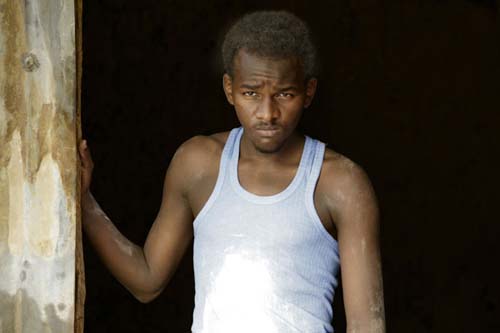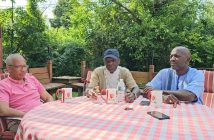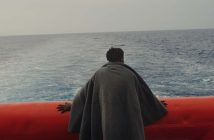In our film review, we already stressed the importance of Daratt for today. To accompany its release on French screens on the 27th of December 2006, we publish this in-depth interview about the film that we have chosen to back with a media partnership. For those who have seen Daratt, don’t tell your friends the ending: simply tell them not to miss it. This interview does not reveal the end but it is clear that, thanks to the light it casts on the film-maker’s methods, it is interesting to read it again after having seen it.
This film is so clear; it really speaks for itself, so it’s actually quite hard to talk about it! I was struck by the way the 200 pupils of the Apt high school listened intently, when they are usually not so calm in front of such minimalist movies. There is so much tension in the film, both in the story and the way it is told. With such a difficult topic, what was your first approach? What were the traps to avoid?
The first thing was that the pair of actors had to work well. The two main characters had to be a pair. One couldn’t act better than the other, or else the film couldn’t have been made. Then, we had to go against the general trend: we had to refine things, play an almost-sensorial card, make the audience feel the warmth of the bakery, the proximity of the bodies, see the space as a place for sharing, and we had to enter a mise en scène, rather that simply direct. By this I mean that it was no longer about the technical aspects but about using the space, working on the look in the eyes, making sure that each shot had a meaning, and that there weren’t just simple transitions or filler shots, which is what we usually learn to do in script writing courses. That’s what allows to maintain the tension, with a very tight editing. I found someone really great, Marie-Hélène Dozo, who does the editing for the Dardenne brothers. She’s quasi-Jansenist. It’s all of this tension that defines the film. Another difficulty was trying to get people to ask themselves « When is this going to happen? », a question that creates an internal tension, and that’s what I wanted to develop from the start, rather than just « Is he going to kill him or not? », which would only have created suspense and would be another way of storytelling.
I felt things differently. For me, the tension was more about knowing how he was going to get out of this situation, how he was going to solve his problem.
It’s the same question: when is he going to take action and how will he manage to get out of this? What interested me was seeing how things were going to happen, and that’s what creates this kind of circularity as regards to the space and to the story, because things repeat themselves. We get the impression that the same scenes keep repeating, a sort of vicious circle which evokes the civil war.
At one point in the film, we feel a ritual is needed. On that level, the closing scene is extraordinary because it is both essential and open. Atim is resolving his history.
Absolutely. In order to break out of this vicious circle, it was necessary to find a ritual and a mise en scène of his own story and his own condition, find a fiction to try and break the vicious circle and have him find his free will. This scene didn’t just come about. I worked on it up until the tenth or twelfth draft. It wasn’t easy at all, it was made because I dug and I was searching for an ending that would match the whole film and its intention.
Did you work alone or was the script written as a team?
With Abderrahmane Waberi, we’d planned to work on it together, but he had the honesty to tell me he didn’t understand what I expected from him. He had never written a script. So I continued on my own and had the difficult task of dealing with the issue of vengeance, which had already been tackled so many times in films. Another trap to avoid was doing the umpteenth film in which the bad guy is killed. I thought of Unforgiven, a 1992 film by Clint Eastwood, where there is immanent justice, a divine justice, but in which the rapists are murdered in the end. I didn’t want to come to that. To be honest, I wanted to suggest a utopia to this Chadian country ravaged for 40 years, and contribute to opening a horizon. This could only happen because, at the end of the film, Atim’s hand doesn’t shake anymore, which symbolically means that he acts in all conscience. It’s at that precise moment that his grandfather, who isn’t duped, tells him « you’ve become a man », because his hand did not tremble. And when, like me, you’ve had this terrible experience of war and weapons, you know that people tremble because they are scared but they still shoot, which means that these people will regret it for the rest of their lives. Others do it in cold-blood, in all conscience, and don’t have any regrets. That’s the idea I wanted to work on, with small details. But you don’t need to have held a weapon to understand the fear that the main character feels at a given moment.
What’s written on the poster disturbs me: « Forgiveness is the only victory ». I didn’t see that in the film, perhaps because I think of forgiveness as a Christian conception. During an interview of Sembène Ousmane, I told him of how some Westerners asked for forgiveness as regards to slavery. He answered: « Why do Westerners spend their time asking for forgiveness? They do it because the Western culture of absolution demands it ». In the film, I didn’t see that kind of forgiveness but I saw someone who stops wanting to assume the weight of others, of this history that his grandfather is passing on to him by asking him to kill.
What’s written on the poster wasn’t an idea of mine, but at a given moment, the film is like a child who’s suddenly taller than you, walks on his own and has his own life. I always try to bring things back to what I wanted to say, but the way a work is interpreted is independent from the author’s will or intentions. Forgiveness is in fact a Christian notion and I don’t know much about it. This brings us back to Eurocentrism, to how we see things only from the point of view of our culture, when it’s actually a simple film, rminimalist and obvious. At the very start, Atim says that his father was killed long before his birth. With Nassara’s wife pregnant, we can transpose the characters to the moment when Atim’s mother was expecting him. This triangle creates a vicious, never-ending circle
and that circle could have gone on turning. Atim defines himself through this circle and finds a way out and that’s why the question is knowing how he will get out as he is in a vicious circle. So the question is not raised as regards to forgiveness but free will.
And it’s about knowing how he will become a man while being in such a situation.
Yes. Becoming a man is going through a learning process.
It is often said that children try to accomplish, without having been asked to do so explicitly, what their parents did not succeed in accomplishing. In your film, it’s very clear that the grandfather gives him a mission. Was it important for you to make that clear?
Yes, I wanted this to be linked to Chad, to this war which affected several generations: the grandfather, the victim-father, and the son. Nowadays, what do you pass on to a young man of 17 or 20 in Chad, in this country independent since 1960, if it isn’t violence and a culture of war? And we ask him to follow the same path. One can only find a way out of it by realizing that one is a free man, free to create his own History and not forced to accept to be its heir just because it’s part of tradition. To open a new horizon or find a utopia, you need to get to this vision of yourself, to move on without dragging behind you the weight of your past.
This character has no other choice but to sort things out himself. And it’s for the spectator to ask himself: « What would I do in that situation? »
Absolutely. It was necessary to always be with Atim and follow his reflection. I like the Socrates process which consists in pushing the spectator to ask himself questions about what he is watching. If you watch with film attentively, it is impossible not to feel like you are inside and sharing this young man’s dilemma.
I think that the film achieves this challenge because everything that touched on entertainment was removed. Through the building-up of images, the script, the editing, you establish from the start a rhythm favorable to reflection and to interiorizing the character.
To achieve this tension, it was important to embody a sort of interior pain. This character is haunted. This rhythm seems to me the most appropriate for the spectator to ask himself the same questions as Atim or any other young Chadian faced with these problems. While we were shooting the film, the rebels attacked N’Djamena and we had to stop. It was the 13th of April 2006, as if history were repeating itself, like a mise en abime of the film itself. Ngarta Tombalbaye was killed on the 13th of April 1975, the first coup d’état. It was also Ali Backa Barkaï (the young actor)’s birthday and we wanted to have a party for him, but it couldn’t be done. Making this film was also battling with men’s foolishness. What are you supposed to do when you’re a young man like him, in a ravaged country where the only thing that is passed on to you is this future, this abyss, where you give weapons to kids so that they can keep the horror alive? Atim realizes that his future only depends on him and his free will.
You raise the question of knowing how a society can break this vicious circle which repeats violence, and you answer it on an individual level: How does one make his own choices? Chad director Issa Serge Coelo’s ‘Daressalam’ is more historical; and other works have been made on matters of impunity, justice, for example in Rwanda. Is this something you would like to work on, the societal side to this ritual that we were talking about earlier on?
If we dealt with this subject from the point of view of a community, it would result in something else. There wouldn’t be as much identification with and empathy for Atim. To make people realize the horror of the situation, it was necessary to focus on one individual and the weight of the mission he was given. I felt it would have a stronger impact and would make the Chadians understand the issue there. Most Chadians were victims of this war one way or another. We had to individualize so as to appeal to everyone, acknowledge a place to everyone and let them each have their say on the subject. I feel individuals have something to offer, not groups. Working in large groups, which is very African, is not the best way to reflect upon violence because it is these groups, those families, who repeat things.
It appears like a preliminary condition: there has to be an individual work before group work can begin.
That’s absolutely right. I don’t believe in a sudden collective conscience. It’s practically counter-revolutionary, in the sense that it would be like a sort of rupture, open unto other eventualities.
Shooting in N’Djamena today, with the rebels attacking the city in the midst of the shoot, and still managing to make a film, is incredible.
Yes, and at the same time, during the shooting, people realized the importance of existing or showing a different aspect of things. This specific violence, because it is spectacular, is much more important for representation, for the media, than a film. It is this conscience that brought us together, all of the Chadian team, technicians and artists included, to make this film. Because of all of the pain we suffered. After all, what is being a good actor or just being in a film? It’s simply that at one moment, the actors realize- and it’s painful- that this moment we’re trying to recreate, which is short and fictional, is actually inscribed in an eternity. And when one realizes that, one puts all of one’s energy into it, more than necessary. We’ve already won this war, because what we do is inscribed in eternity. That’s what gave us the strength to continue the film, to brave even insecurity. We went into the desert even though rebels were roaming about. The Chaiand team agreed that it wouldn’t be the same film if we didn’t go into the desert, so we eventually went and were happy to have done it. We feel it was useful against the absurdity of war.
« Atim » means « orphan ». Nassara keeps asking him who his father is even though he is called « orphan »! This character is in permanent contradiction, there’s a doubt he’s not able to express.
Yes, and in Africa, not answering to « Who is your father? » is seen as very violent. I think that Nassara guesses that this young man is the offspring of one of the men he killed. That’s why he goes and snoops around in his belongings, and steals the first gun he has. At the same time he tries- and that reflects the humanity and unpredictability of the character- to push Atim to prayer, thanks to which he has found the path to redemption. It seems that he really wants Atim to do this so that he doesn’t repeat his mistakes. Atim is a potential Nassara and he sees himself in his otherness. His problem is trying to define himself as regards to this and that’s what he is trying to figure out in the end.
The character of Nassara is very subtle: we understand that he regrets the pain he has inflicted on others throughout his life and at the same time, there is a bit of violence left in him that he doesn’t know how to handle. He is terribly human.
Both of them have a problem that they cannot talk about, which is Atim’s father. Nassara asks about it but when he is asked if he really wants to know, he doesn’t answer. It’s as if there was a corpse or the ghost of the father’s corpse between them. Maybe Nassara realizes, with time, that he was a criminal, a monster, and Atim carries this pain, which they are unable to talk about. Hence the impossibility of building something or sharing the space with serenity. Tension is unavoidable. In fact, in reality, the film doesn’t say that it’s the end of violence: while the tension is there, things can explode anytime. It’s a bit like in Kitano’s films, in which violence crops up suddenly.
What’s very well done is that in the end, Atim embodies the kind of violence that Nassara has probably exerted over others. He is like a mirror; it shows his own difficulty in trying to get in touch with himself.
Yes. There is violence in him, which he is trying to control because he is confronted with another kind of violence which is a level higher and to which he could give in. And that’s what creates all this hesitation: beating around the bush, thinking. It goes beyond the power of speech, no dialogue is possible. In Chad, people were expecting another ending, a reflection of reality- they were surprised
that Atim leaves with Nassara’s wife, has a relationship with her to really avenge his father, and kills Nassara in the end. But what the film offers is an opening. The issue of Chadian politics goes beyond the country, because we don’t present it as folklore or a faraway story. I add it to the list of inhumanities to give it some sort of humanity. I never forget the first vision of Africa given by others, the image of the original sin. I never forget it, and I try not to make of Africa a show that we watch from a distance. Just by being myself.
One of the great strengths of the film is that it refuses to give Atim the possibility of forviving, as we call it in my country. He is always rejecting everything: a tender gesture or anything else that he is offered. How did this young actor live this situation?
He is someone who talks very little, reads a lot, and is very intelligent and very good at what he does. I often went to see him, asked him how he was and one day, he told me: « I don’t know who I am anymore ». As for the actor playing Nassara, he was in tears at the end of the shooting. That’s also the trouble, these are roles that leave a mark, that have haunted them because we managed to create character roles, which is quite rare in our cinema, that usually produces contemplative films or day-to-day chronicles. What I like is walking on the tightrope, knowing that I might fall, but that if I fall, it won’t be that serious because that’s what life is. There’s no other solution when you’re driven to the brink than taking a jump and trying to find the way. After that, either you survive, or you die! It’s like what happens to those boat people who leave Senegal; that’s the way I see it.
How did you find the actors?
Youssouf Djaorao, who plays the baker, had played in Daressalam and I’d noticed that he really stood out. When I offered him the part, I knew he could do it, judging from his story, his history, and I quickly saw him go through a change. Afterwards, I asked him to shave his head and let his beard grow and all of this contributed to the making of his character. For young Atim, we had neither the money, nor the will to see hundreds of people to find the one who could play the part. I met four boys and with his eyes, his love for poetry, his intelligence, I knew that he was the one we would work with. He was a good actor; I discovered that in this film. And because he was really under the skin of his character, he even made suggestions and came to see me if he thought I was doing things that he felt were contrary to the character’s psychology, which is quite extraordinary for someone who had never acted in a film and who was 17 when we started the shooting. These two people brought the film alive.
For the production, you worked with Abderrahmane Sissako. You both work in very small structures, it must be hard.
Yes and no. We do work in small structures, we have only our passion for cinema and our friendship that allows us to understand each other, we think the same way which makes things progress despite the small production, but we were lucky enough to meet people who helped us from the start of the project, which allowed the film to exist even though we didn’t have much means.
It’s true that when you see the film, you imagine it was a small production, there weren’t any big settings or lots of extras.
Yes. I’m glad because the setting for the bakery was made by Chadians who started as assistants and I like seeing them evolve like this. We respected the time we’d set for making the film; we even finished it before time was up, with a team that we would call « not professional ». But they know that making a film, for Chad and for themselves or for me, was important so they worked really hard. So let’s stop saying that there were no professionals and that that doesn’t make important films which could justly represent Africa for the rest of the world. By being conscientious, it’s possible to find the right people because they have the desire to tell, to see themselves on a screen and it’s for us, film-makers, to make use of that. Professionals are what they are thanks to their work with film-makers. They are people that we hire and who, progressively, become professionals by learning on the job. « Evening-school », as Sembène said.
It was the first time you shot without Kalala, your assistant director and very close friend. I guess you felt something was missing?
Yes. I felt Kalala’s absence but at the same time, I felt his presence, like his shadow was cast over the shooting. It was extraordinary for me because I don’t believe in mystical things, I’ve never believed in them, in the relations between the visible and the invisible, but then, I was under the impression that nothing bad could happen. Despite all of the problems we had, with the cameras, the lenses that were destroyed, war that broke out, I felt Kalala was still here. It was a very strong feeling, the crew couldn’t stop talking about it and his spirit was truly with us. Now I have finished mourning, even if the memory of him is indestructible and it seems that he lived through this film with me and that now, we are ready to move on to other things.
///Article N° : 5944









